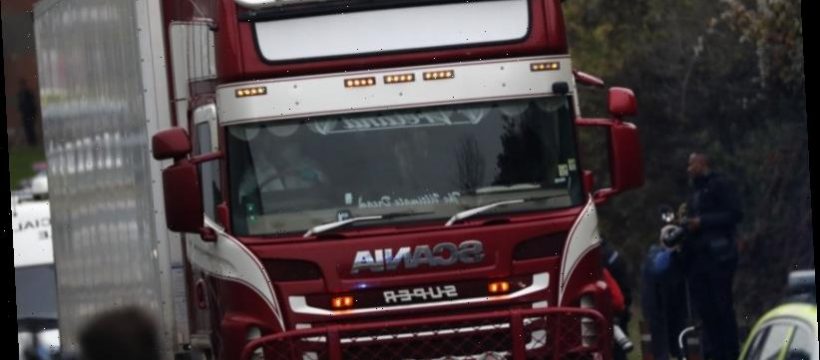At the turn of the century, Britain was shocked by twin tragedies involving Chinese migrants. Now another tragedy is serving as a painful reminder of the dangers posed by human trafficking.
On June 20, 2000, the bodies of 58 Chinese nationals were found in a shipping container in the English port city of Dover. Then-prime minister Tony Blair said that the event showed the need to stamp out the "evil trade in people".
Police escort the truck in which the bodies were found on Wednesday.Credit:AP
Another tragedy only a few years later showed that, even once they arrive in Britain, illegal immigrants were at risk. A group of inexperienced Chinese immigrants working as cockle pickers in Morecambe Bay found themselves trapped as the tide turned on February 5, 2004. Despite a frantic rescue effort, at least 21 drowned.
In the years since, the subject of Chinese immigration to Britain was overshadowed by a focus on wealthy investors from the growing economic power and rising numbers of migrants and refugees from the Middle East and Africa.
But this week, British police announced that they had found the bodies of 39 people in the back of a tractor-trailer at an industrial park in Grays, Essex. On Thursday, police announced that the dead "are believed to be Chinese nationals".
The news that yet another British tragedy may have involved Chinese migrants drew pointed reactions from Beijing.
Demonstrators hold banners and candles during a vigil for the 39 lorry victims, outside the Home Office in London on Thursday.Credit:AP
Hu Xijin, editor of the state-owned and fiercely patriotic Global Times newspaper, wrote critically of the news on the blogging platform Weibo.
In a message to The Washington Post, Hu said it needed to be considered not only whether there was a problem with "serious discrimination and inhumanity" in the way that British authorities handled illegal immigrants, but also why Chinese nationals were becoming illegal migrants to Britain.
"Why are there at least three major mass deaths in the UK where the victims are Chinese?" Hu said. "China is not so poor that people can't live here, nor is there war. There are many ways to go abroad legally. Chinese people should also be able to find ways to safeguard their rights abroad."
The Chinese embassy in London said that it had a "heavy heart" when it read the reports, Chinese ambassador Liu Xiaoming said.
"We are in close contact with the British police to seek clarification and confirmation of the relevant reports," he tweeted.
It is not clear how many Chinese nationals are living in Britain illegally, although estimates run to the hundreds of thousands. Some are refugees, fleeing political persecution, but others have come for economic reasons.
The UN refugee agency says that globally there were 212,100 refugees who came from China by the end of 2018, making it among the largest countries of origin. Members of the Uighur minority have left the country in large numbers, fleeing a government crackdown that has hundreds of thousands placed in internment camps.
The British government has run a hostile environment policy that has targeted illegal migrants since 2012, often pressuring Chinese migrants in the process. Last summer, restaurant workers in London's Chinatown held a mass protest against the measure, telling reporters that the laws were being aggressively and unfairly enforced.
But surveys of illegal Chinese immigrants have found that many are exploited by their employers. After the Morecambe Bay disaster, police said that the migrants had been paid just £1 ($1.90 at current exchange rates) a day for nine hours of work in dangerous conditions.
British police blame "snakehead" gangs for trafficking Chinese nationals into Britain. Lin Liang Ren, a gang master who had threatened survivors of the Morecambe Bay disaster, was later sentenced to 14 years in prison for 21 counts of manslaughter and other charges, but was deported halfway through his sentence.
After the discovery of the bodies in Dover, a Dutch driver was sentenced to 14 years in jail for manslaughter. The migrants had paid a gang for passage to Britain, but suffocated when the driver closed a vent. The only survivor later told a British court that they had been told by smuggling gangs that they would arrive in Britain by plane.
Though tactics to stop human trafficking improved after that incident, the small port where the shipping container arrived in Britain on Wednesday, Purfleet in Essex, did not have the technology needed to scan containers.
Charles Elphicke, a British member of Parliament who represents Dover, wrote on Twitter that his community had never forgotten the deaths of the Chinese nationals in 2000, adding that it was time to "put a stop to this evil trade".
The Washington Post
Source: Read Full Article


